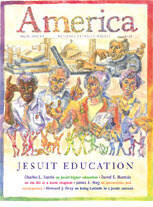Making cookies, spending long nights in the local hospital emergency room and giving relationship advicewhen I joined the Jesuits five years ago, I would have never guessed that these tasks would one day comprise my job description. As I conclude an academic year living as a residence hall chaplain among undergraduate men and women at Loyola University Chicago, I have a newfound appreciation for the complexity of college students and the sometimes difficult, sometimes carefree lives they lead. I also hold a staunch conviction that the work of a residence hall chaplain is vital, especially at this crucial time in the formation of young people and in a world where spiritual issues are sometimes viewed as folly.
A Jesuit friend and fellow chaplain remarked to me at the beginning of the school year that living in the dorms is akin to mission work. I have since discovered just how appropriate this comparison is. A residence hall chaplain has to learn the language of the people with whom he or she lives and needs to build trusting relationships in order to discover how best to serve them. Although I still fancy myself as young and "cool," I was a bit startled to discover how much learning I needed to do in order to converse with the students. For example, I had never watched a show on the WB network, and until last autumn this had not particularly bothered me. While I cannot say that I am now an avid viewer, I have tuned in time and again to acquaint myself with some of the fresh, model-esque characters in order to keep up during pop culture discussions over lunch. Whatever happened to "Family Ties"?
Each residence hall chaplain needs to find a niche, an approach to ministering that utilizes his or her talents and takes into consideration the realities of dorm life. I decided in August to spend the first semester primarily meeting students and building relationships. The fact that over 200 men and women live on my six assigned floors made this a daunting task. I needed to discover a way to ingratiate myself with these nascent college students, and what better way than by offering food! Most college dorm food is high in quantity but lacking in quality, so I figured I had chosen wisely. I began a weekly ritual of baking six or seven dozen chocolate-chip cookies and distributing them on the floors of the dorm. At first, conversations were brief and superficial at best, with an occasional sarcastic remark thrown out by a few hard customers. But as the semester moved forward, so did the quality of my interactions.
Consistency and authenticity are extremely important when relating to undergraduates; they can detect hypocrisy with the deftness of a bloodhound. As I reflected on this I began to realize that, besides cherishing my free homemade cookies, the students really appreciated the regularity of my visits. They knew that on Tuesday nights I would more than likely show up to spend some time with them. I truly enjoyed being with them; my presence was not for show, but rather came from a desire to learn more about their lives. Slowly the students began taking me into their confidence and asking my advice on various topics, like relationships, parents and even religious questions. Others needed someone to "vent" to about being homesick, having too much work or dealing with seemingly impersonal professors. Unless a student gets along unusually well with a roommate, these topics are usually not among the daily conversational fare for the average undergraduate. By disclosing these personal experiences to me, they were inviting me into their world. When this occurs, the "brochure description" of a residence hall chaplain’s job came to life, and seemingly mundane interactions became infused with sacredness.
For my part, I found that I also needed to do my own inviting. One of the endemic conditions from which undergraduates suffer is "poster blindness." Student organizations inundate campus kiosks and bulletin boards with a flood of flyers and announcements. After a while they all become one big neon blur. Even if a particular advertisement catches a wandering eye, the schedules and priorities of the average undergraduate more than likely dictate against their attendance. This is why personal invitations are so important. Most people like being called by their first nameit acknowledges their identity and worth as a human being. This is all the more true for undergraduate students in their first two years of college, because they can at times feel lost on a large campus amid thousands of other students. I found that learning names, as difficult as it can be, greatly increased my credibility and placed me in the privileged position of being able to extend personal invitations to students.
Since it is impossible for a residence hall chaplain to extend personal invitations to every student, it is important to decide who will receive the "preferential option." There are some wonderful students at universities and colleges all over the country who become involved with campus ministry the moment they set foot on campus. They are truly a gift. Most ministry programs could not exist without them, and no arm-twisting is required to get these young people to show up for events. But rather than "preach to the choir," I chose to reach out to the students who couldn’t locate the ministry center on a campus map even if it was emblazoned with a bright yellow cross! The young woman who drinks a bit too much and hangs out with questionable characters, the guy who was written up for fighting and, yes, even the kid with the orange spiked hairthese are the students with whom I chose to spend a good deal of my time. I did not do this to be a martyr or because I wanted to shun any of the other students. In fact, upon reflection, I think that these students touched upon a part of myself that is still self-conscious and insecure. Perhaps this enabled me to identify with them a bit more. In many ways, I felt more comfortable with the "rebel" and the "outcast" and may have had more to offer them because of my own experiences dealing with the sometimes harsh realities of the college years. A residence hall chaplain cannot intimately touch every student’s life, so one needs to discern how best to match one’s God-given gifts and abilities to the specific needs of the population placed before him or her.
Early in the fall I was called in on a case involving a student from my residence hall. He had been drinking heavily and was threatening suicide after the campus police restrained him. I rode along as he was transported to the hospital, absorbing his livid prose while clumsily trying to calm him down. After a long night and early morning in the E.R., he was released and sent home. I followed his case through the university disciplinary system, offering support to him and reassuring him that he wasn’t a bad person because of this painful mistake. As the academic year drew on, I became better and better acquainted with him, and we established a friendly rapport.
This past Lent I invited this student to attend a weekly dorm worship service a few of us initiated to bring students together for prayer and reflection. I felt comfortable doing this because of the history between us and because I thought he would garner much from the experience. His initial response was not enthusiastic, but, much to my surprise, he began to attend regularly. During our prayer one particular week, he thanked God for being invited and said that the services were the highlight of his semester. I smiled as the memories of early morning fire alarms and annoyingly loud parties became insignificant. I knew right then that, although I could not reach out to every student, this one young man shed light on the meaning of my ministry. For a residence hall chaplain, to borrow a phrase from the modern-day college student vernacular, "that’s the stuff!"








